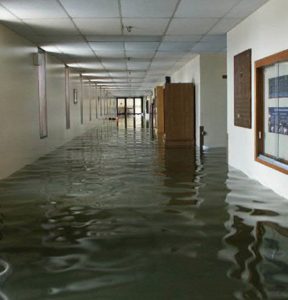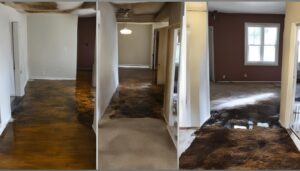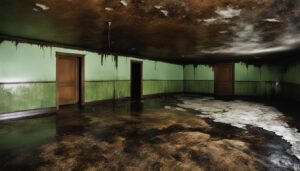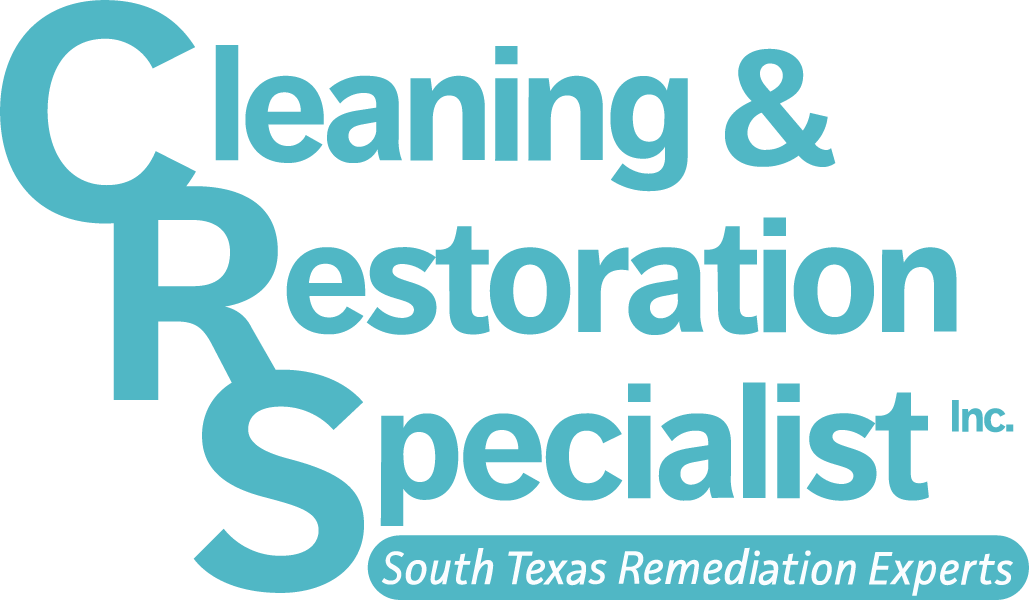Mold infestation is a serious concern for any homeowner. The presence of mold can not only affect your property value but also pose significant health risks. If you are dealing with mold growth in your home, you may be wondering whether it is safe to stay in the house during mold remediation. While there is no straightforward answer to this question, it’s important to understand the facts to make an informed decision.
It’s important to note that mold remediation is a complex process that involves the use of various chemicals and equipment to remove the mold. As a result, it is crucial to take the necessary precautions to minimize exposure to mold spores. Additionally, the severity of the mold infestation can also impact whether it’s safe to stay in the house during mold remediation.
Key Takeaways:
- Mold remediation is a complex process that involves the use of chemicals and equipment to remove the mold.
- The severity of the mold infestation can impact whether it’s safe to stay in the house during mold remediation.
- It’s important to take the necessary precautions to minimize exposure to mold spores, which can pose potential health risks.
- Mold growth can affect your property value, so it’s crucial to address the issue promptly and effectively.
- Consulting with professionals is the safest way to ensure that your home is free of mold and safe for you to stay in during the remediation process.
Understanding Mold Remediation
Before diving into the safety aspects, it’s essential to understand what mold remediation is and its crucial role in maintaining a healthy living environment.
Mold remediation is the process of identifying, containing, and removing mold from a building or home. It involves several steps, including identifying the source of mold growth, isolating the affected areas to prevent further contamination, and removing the mold safely and effectively.
The importance of mold remediation cannot be overstated. Mold growth can cause structural damage to buildings, contaminate indoor air quality, and pose a significant risk to human health. Mold spores can trigger allergic reactions, respiratory problems, and other health issues, particularly in individuals with compromised immune systems.
Moreover, mold growth is a sign of an underlying moisture problem. If left unaddressed, the moisture problem can lead to more severe structural damage and mold growth, increasing the risk to human health and reducing the value of the property.
Therefore, timely and effective mold remediation is critical to maintaining a safe and healthy living environment. It can help prevent further mold growth, restore indoor air quality, and ensure the structural integrity of the building.
When dealing with mold growth, it’s crucial to work with a professional mold remediation company that has the expertise, tools, and equipment to handle the job safely and effectively. Attempting to remove mold on your own can be dangerous and ineffective, putting your health and the structural integrity of your home at risk.
Potential Health Risks During Mold Remediation
Mold exposure can have severe health consequences, and the remediation process can further aggravate the risks. When mold spores are disturbed, they can be released into the air, and if inhaled, they can cause a range of health problems. While not everyone is susceptible to mold-related health issues, certain individuals, such as children, the elderly, and those with weakened immune systems, are at a higher risk of developing health complications.
The dangers of mold exposure during remediation include:
- Respiratory problems such as wheezing, coughing, and difficulty breathing
- Allergic reactions such as skin rashes and eye irritation
- Mental and neurological symptoms such as headaches, confusion, and memory loss
- Systemic infections in individuals with weakened immune systems
If you experience any of these symptoms during or after mold remediation, seek medical attention immediately.
It is crucial to take the necessary precautions to protect yourself during mold remediation. Even if you do not experience any symptoms, it is essential to assume that mold exposure can be harmful to your health.
Safety Measures During Mold Remediation
The process of mold remediation involves disturbing the mold, and this can cause the release of spores into the air, which can be harmful to your health. It is crucial to prioritize your safety during mold removal.
Here are some safety precautions to keep in mind:
- Wear personal protective equipment (PPE) such as gloves, goggles, and an N95 respirator mask to prevent inhaling mold spores.
- Ensure proper ventilation by opening windows and doors or using exhaust fans to allow fresh air to circulate and push out contaminated air.
- Contain the contaminated area using plastic sheeting and tape to prevent the spread of mold spores.
- Use a wet vacuum or mop to clean up mold instead of dry sweeping or using a regular vacuum, which can stir up spores into the air.
- Dispose of any contaminated materials in sealed plastic bags to prevent further contamination.
- After completing mold remediation, clean and disinfect all surfaces thoroughly.
Following these safety measures can significantly reduce your exposure to mold spores and protect your health during the remediation process.
Evaluating the Severity of Mold Infestation
Assessing the severity of mold infestation is crucial to determine whether it is safe to stay in the house during mold remediation. The extent of mold contamination can help professionals identify the appropriate safety measures to be taken.
One way to evaluate the severity of mold infestation is by looking for visible signs of mold growth, such as discoloration or a musty odor. If the mold covers an area of more than 10 square feet, it is considered a significant infestation that requires professional attention.
| Severity of Mold Infestation | Symptoms and Physical Indicators |
|---|---|
| Level 1 – Small Infestation | Mold growth in small areas (up to 10 square feet) on non-porous surfaces, such as tiles or glass. |
| Level 2 – Moderate Infestation | Mold growth in several areas (up to 100 square feet) on non-porous surfaces or a single area of up to 10 square feet on porous surfaces, such as drywall or carpeting. |
| Level 3 – Large Infestation | Mold growth in multiple areas (more than 100 square feet) on porous or non-porous surfaces. |
If you are unsure about the severity of mold infestation in your home, it is best to consult professionals who can conduct a thorough inspection and provide an accurate assessment.
Determining the extent of mold contamination is essential to ensure a safe and effective remediation process.
Collaborating with Professionals for Mold Remediation
If you’re dealing with mold infestation in your home, it’s essential to hire professionals for mold remediation services. Mold growth can be dangerous to your health, and removing it requires proper techniques and equipment. Professional mold remediation companies have the expertise, tools, and experience to handle the job safely and effectively.
Overall, hiring professional mold remediation services is the best way to ensure a safe and thorough removal of mold from your home. Call Cleaning & Restoration Specialist today at (210) 571-7252.
Conclusion
After considering the information presented in the previous sections, it is important to prioritize your health when faced with mold remediation in your home. Staying in a house during mold remediation can pose potential health risks, especially if not handled correctly.
It is crucial to understand the severity of the mold infestation and consult with professionals to determine the best course of action. Collaborating with a professional mold remediation company can significantly enhance the safety and effectiveness of the process, minimizing exposure to mold spores and protecting your health.
Always remember that your safety should be the top priority during mold remediation. Take necessary precautions as discussed in this article to stay safe and healthy, and don’t hesitate to seek professional help if needed. By doing so, you can ensure a mold-free and safe living environment for you and your loved ones.
FAQ
Is it safe to stay in a house during mold remediation?
Staying in a house during mold remediation can pose certain risks. It is important to consult with professionals to evaluate the safety of staying in your specific situation.
What is mold remediation?
Mold remediation is the process of removing mold and preventing its growth in an affected area. It typically involves identifying the source of moisture, containing the mold, and removing or cleaning affected materials.
What are the potential health risks during mold remediation?
Exposure to mold during the remediation process can lead to various health issues, including allergic reactions, respiratory problems, and skin irritation. It is important to take precautions to minimize exposure.
What safety measures should be taken during mold remediation?
To ensure safety during mold remediation, it is important to wear protective clothing and equipment, isolate the affected area, use proper ventilation, and follow industry best practices. Consult with professionals for specific guidelines.
How can I evaluate the severity of mold infestation?
Assessing the severity of mold infestation involves examining the extent of mold growth, the type of mold present, and the potential for further damage. Professionals can help determine if it is safe to remain in the house during remediation.
Why should I hire professional mold remediation services?
Hiring professionals for mold remediation ensures that the process is conducted safely and effectively. Professionals have the expertise, equipment, and knowledge to identify and address mold issues, reducing the risks associated with mold exposure.
Please note that these FAQs are intended as general information and it is important to consult with professionals for specific advice and recommendations based on your individual circumstances.









